Choosing the Best Air Compressor for Impact Wrenches: A Comprehensive Guide

When it comes to using impact wrenches, having a reliable air compressor is essential. Whether you are a professional mechanic or a DIY enthusiast, selecting the right air compressor for your impact wrench is crucial for optimal performance. The air compressor you choose should provide sufficient power to meet the demands of your wrench, ensuring smooth and efficient operation.
There are several factors to consider when selecting an air compressor for impact wrenches. The first is the air flow, measured in Cubic Feet per Minute (CFM). Impact wrenches require a constant supply of air to operate at their full potential, so it is important to choose an air compressor with a CFM rating that matches or exceeds the requirements of your wrench. This will prevent any loss of power or performance.
Another important factor to consider is the air pressure, which is measured in pounds per square inch (PSI). Impact wrenches typically require a higher PSI to deliver the necessary torque for loosening or tightening bolts. Therefore, it is crucial to select an air compressor that can provide the recommended PSI for your impact wrench, allowing it to work effectively and efficiently.
Understanding Impact Wrenches
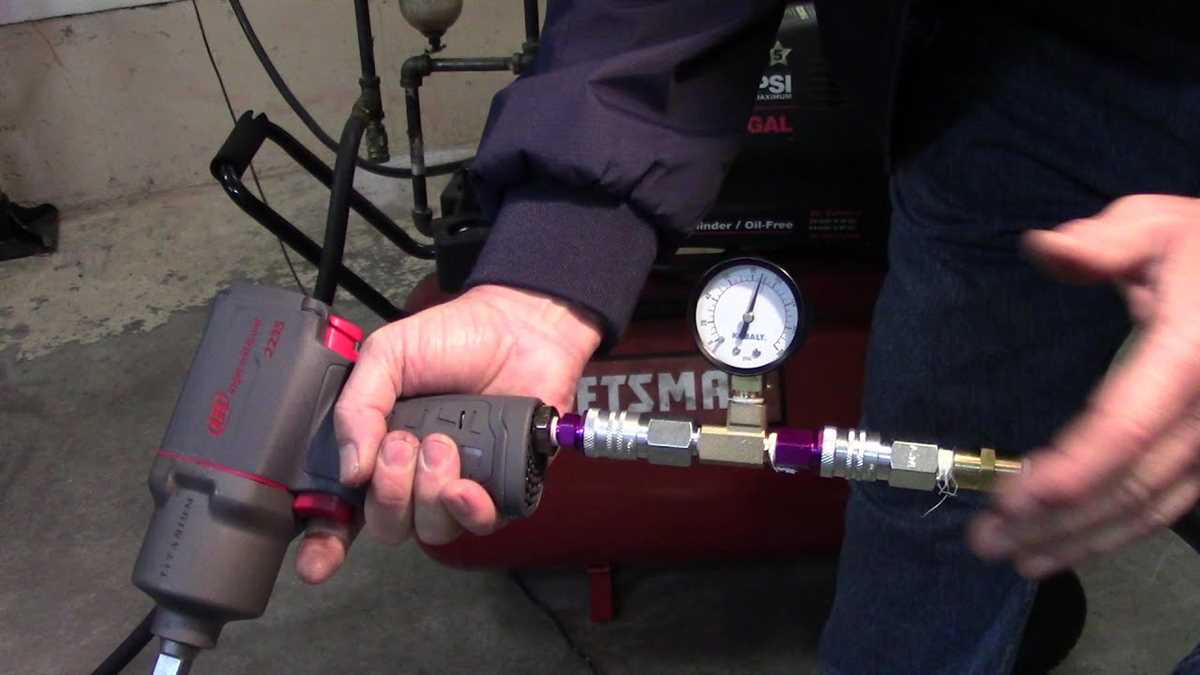
An impact wrench is a powerful tool used for fastening or loosening bolts and nuts. It is commonly used in automotive repair and construction industries. The main advantage of an impact wrench is its ability to deliver high torque output using a series of short, powerful bursts. This makes it highly effective for tasks that require a lot of force, such as removing lug nuts on a car or driving screws into dense materials.
Impact wrenches come in various sizes and power options. They can be powered by compressed air, electricity, or battery. Air-powered impact wrenches, also known as pneumatic impact wrenches, are the most common type used in professional settings. They are highly durable and offer a high power-to-weight ratio. Electric impact wrenches, on the other hand, are more portable and convenient for home use as they don’t require an air compressor.
When choosing an impact wrench, it is important to consider the torque output, speed, and size. Torque is a measure of rotational force, and it determines the wrench’s ability to fasten or loosen bolts. A higher torque output is generally better for tasks that require more force, but it also comes with a larger and heavier wrench. Speed is also an important consideration, as a higher speed allows for faster work. Additionally, the size of the impact wrench should be suitable for the specific task at hand.
Overall, understanding the capabilities and features of impact wrenches is crucial for choosing the best one for your needs. Whether you are a professional mechanic or a DIY enthusiast, selecting the right impact wrench will make your work more efficient and effective.
Considerations for Choosing an Air Compressor
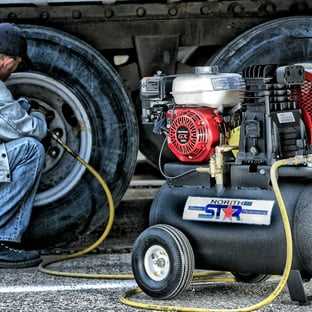
An air compressor is a crucial tool for powering an impact wrench. However, choosing the right air compressor for your impact wrench can be a daunting task, considering the numerous options available in the market. To make an informed decision, it is important to consider several factors.
1. Air Pressure and Volume
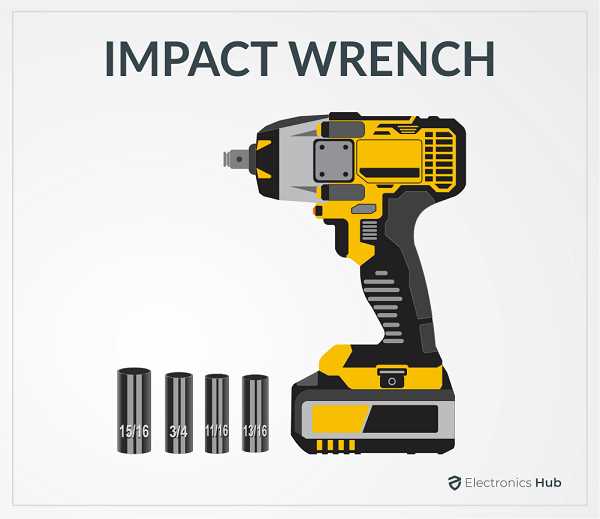
The air pressure and volume are important factors to consider when choosing an air compressor for an impact wrench. Impact wrenches require a constant and steady air supply to deliver optimal performance. The air pressure, measured in pounds per square inch (PSI), should meet or exceed the recommended PSI for your impact wrench. Additionally, the air volume, measured in cubic feet per minute (CFM), should be sufficient to meet the demands of the impact wrench.
2. Tank Size
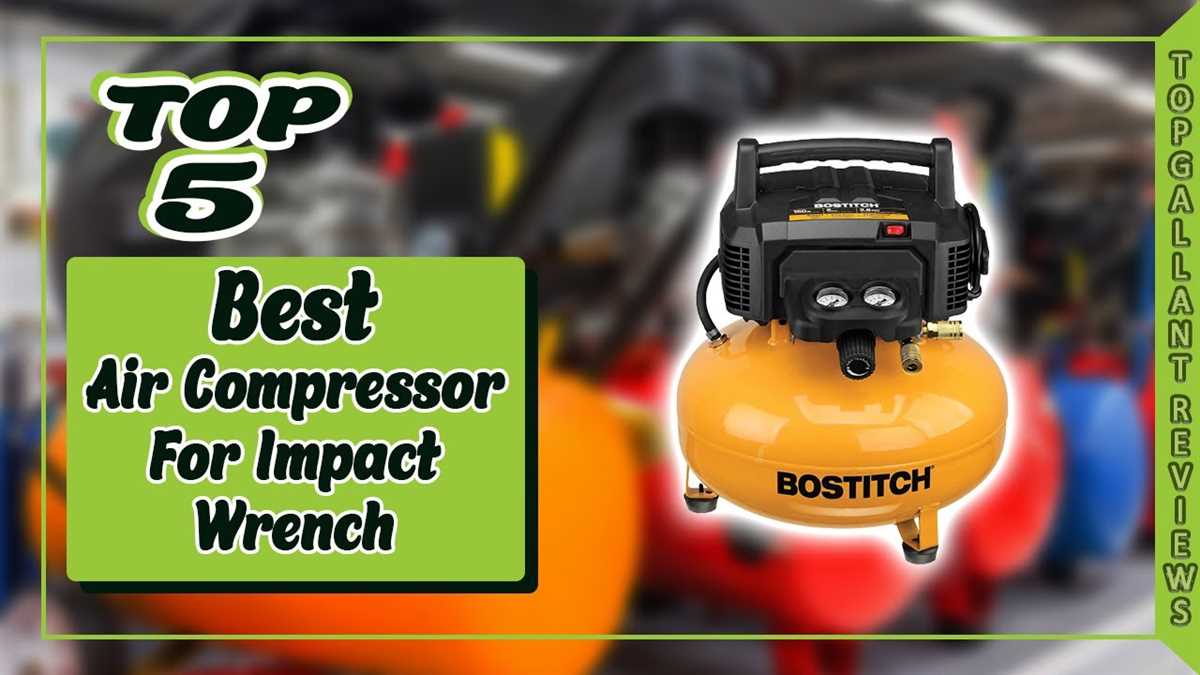
The tank size of an air compressor determines the amount of compressed air it can store. A larger tank size can offer longer operating times before the compressor needs to refill. However, a larger tank may also lead to a bulkier and less portable air compressor. Consider the specific needs of your impact wrench and choose a tank size that strikes a balance between portability and operating time.
3. Power Source
Another consideration when choosing an air compressor for your impact wrench is the power source. Air compressors can be powered by electricity, gasoline, or batteries. Each power source has its own advantages and limitations. Electric compressors are typically more convenient for indoor use, while gasoline-powered compressors offer greater mobility for outdoor or remote work. Battery-powered compressors provide portability but may have limited run time.
4. Noise Level
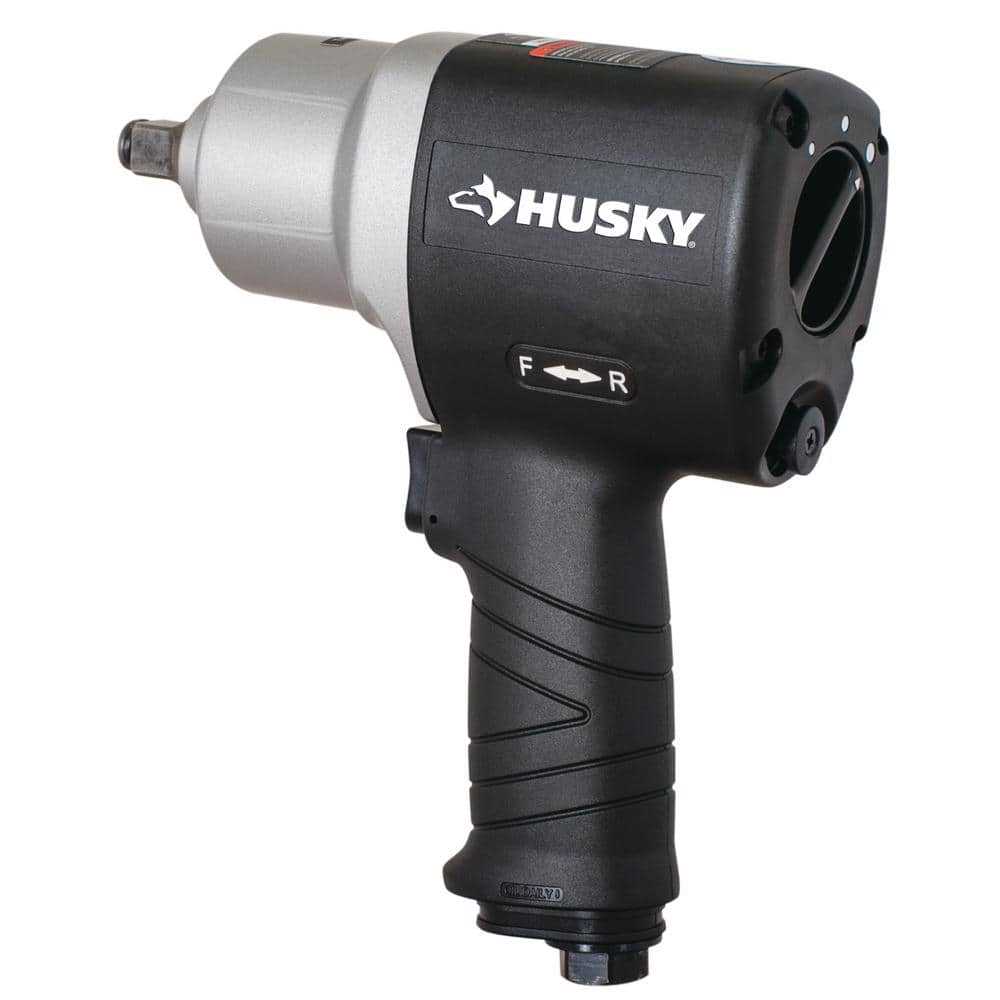
Noise level is an important factor to consider, especially if you will be using the air compressor in a residential area or noise-sensitive environment. Some compressors are designed with noise reduction features to minimize their operating noise. Consider choosing a compressor with a lower decibel rating to ensure a quieter working experience.
5. Maintenance and Durability
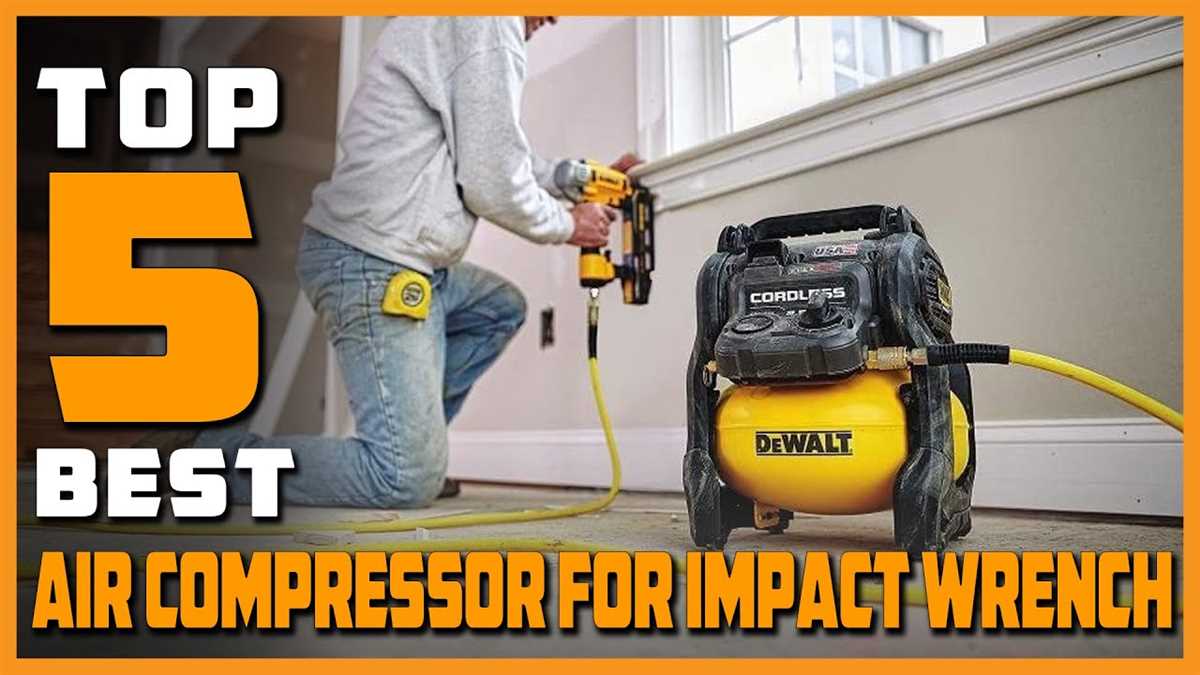
Lastly, consider the maintenance and durability of the air compressor. Look for a compressor that is easy to maintain, with readily available replacement parts and a warranty. Also, consider the build quality and durability of the compressor to ensure it can withstand the demands of regular use.
By considering these factors and understanding the specific requirements of your impact wrench, you can choose an air compressor that will provide reliable and efficient power for your tool.

Air Compressor Capacity and PSI Requirements
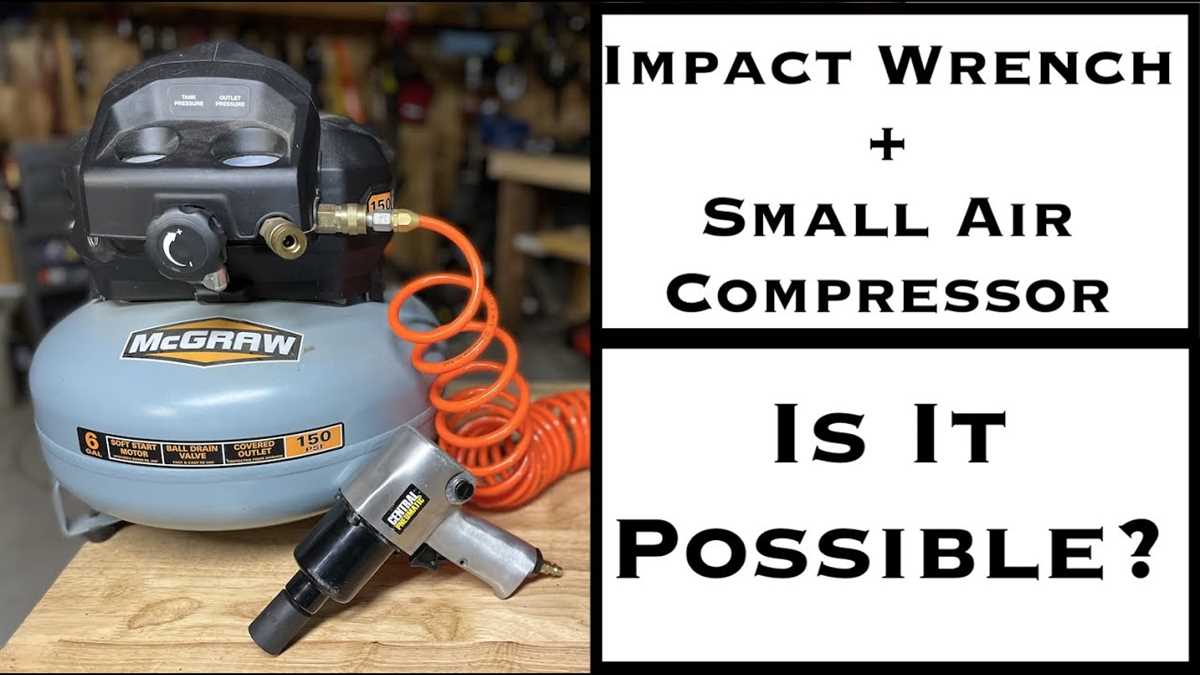
When choosing an air compressor for your impact wrench, it’s important to consider its capacity and PSI requirements. The capacity of an air compressor is measured in gallons and refers to the amount of air it can hold. A higher capacity generally means that the air compressor can provide a higher volume of air, which is important for powering impact wrenches.
The PSI (pounds per square inch) requirement of an impact wrench is the amount of pressure it needs to operate effectively. Different impact wrenches have different PSI requirements, so it’s crucial to choose an air compressor that can supply the necessary pressure. Make sure to check the manufacturer’s specifications for the impact wrench you plan to use.
It’s worth noting that using an air compressor with a lower capacity or PSI than required can result in poor tool performance and can even damage the impact wrench. On the other hand, using an air compressor with a higher capacity or PSI than needed may be unnecessary and can lead to increased energy consumption.
So how do you determine the right air compressor capacity and PSI for your impact wrench? One way is to check the impact wrench manufacturer’s recommendations. They often provide a range of suitable capacities and PSI requirements. If you’re unsure, it’s always a good idea to choose an air compressor with a slightly higher capacity and PSI than the maximum recommended by the wrench manufacturer.

Additionally, it can be helpful to consider the type and frequency of your work. If you’re planning to use the impact wrench for heavy-duty applications or in a professional setting, a larger capacity and higher PSI may be necessary to ensure consistent and efficient operation. On the other hand, if you only need the impact wrench for occasional DIY projects, a smaller capacity and lower PSI may be sufficient.
The Importance of CFM and Tank Size
When it comes to choosing an air compressor for impact wrenches, two crucial factors to consider are CFM (cubic feet per minute) and tank size. Understanding the importance of these two aspects will ensure that you select the right air compressor for your impact wrench needs.
CFM:
CFM is a measure of the air volume that an air compressor can deliver. It refers to the amount of air flow that the compressor can provide per minute. For impact wrenches, a high CFM rating is essential as it determines the tool’s ability to deliver sufficient power and torque. It is crucial to select an air compressor with a CFM rating that matches or exceeds the CFM requirements of your impact wrench.
Tank Size:
The tank size refers to the storage capacity of the air compressor. A larger tank size allows the compressor to store more compressed air, which is essential for maintaining a continuous and consistent airflow. It provides a buffer and ensures that the impact wrench receives an uninterrupted supply of air, especially during demanding tasks that require prolonged use.
When choosing an air compressor, consider the anticipated usage of your impact wrench and the frequency of use. If you plan to use the impact wrench for extended periods or for heavy-duty applications, a larger tank size is recommended. On the other hand, if you will be using the impact wrench for shorter durations or lighter tasks, a smaller tank size may be sufficient.
Conclusion:
Both CFM and tank size are critical factors to consider when selecting an air compressor for impact wrenches. Ensuring a high CFM rating and an appropriate tank size will guarantee that your impact wrench performs optimally and efficiently. Take the time to evaluate your needs and research the CFM requirements and tank size recommendations for your specific impact wrench model to make an informed decision.
Power Source: Electric versus Gas-powered Compressors
When choosing the best air compressor for your impact wrench, one of the main considerations is the power source. There are two primary options to choose from: electric-powered compressors and gas-powered compressors. Each has its own advantages and disadvantages, so it’s important to understand the differences before making a decision.
Electric-powered Compressors
Electric-powered compressors are a popular choice for many professionals and DIY enthusiasts. They are more commonly used in indoor applications, such as automotive workshops or home garages. These compressors are powered by electricity, which means they need to be plugged into an electrical outlet. This can be a limitation if you need to use the compressor in remote locations where electricity may not be readily available.
- Advantages of Electric-powered Compressors:
- Quiet operation: Electric compressors tend to operate more quietly compared to gas-powered ones, making them suitable for working in noise-sensitive environments.
- Low maintenance: Electric compressors generally require less maintenance compared to gas-powered ones as they don’t have a combustion engine.
- Environmentally friendly: Electric compressors produce zero emissions, making them more environmentally friendly compared to gas-powered compressors.
- Disadvantages of Electric-powered Compressors:
- Less portability: Electric compressors are limited by the length of their power cord, which can restrict their mobility.
- Lower power output: Electric compressors typically have lower power output compared to gas-powered models, which can affect their performance with heavy-duty impact wrenches.
Gas-powered Compressors
Gas-powered compressors, as the name suggests, are powered by gasoline or diesel fuel. These compressors are more commonly used in outdoor settings, such as construction sites or remote locations where there is no access to electricity. Gas-powered compressors provide a higher level of portability but come with their own set of considerations.
- Advantages of Gas-powered Compressors:
- High power output: Gas-powered compressors typically provide higher power output compared to electric models, making them suitable for heavy-duty tasks and large impact wrenches.
- Greater portability: Gas-powered compressors can be used in remote locations where there is no access to electricity, offering greater portability and flexibility.
- No power cord limitations: Gas-powered compressors do not have the constraints of a power cord, allowing for more freedom of movement.
- Disadvantages of Gas-powered Compressors:
- Noisy operation: Gas-powered compressors tend to be louder compared to electric ones, which can be a drawback in noise-sensitive environments.
- Higher maintenance: Gas-powered compressors require regular maintenance, including fuel and oil changes, spark plug replacements, and air filter cleanings.
- Environmental impact: Gas-powered compressors emit exhaust fumes and are not as environmentally friendly as electric models.
When deciding between an electric-powered compressor and a gas-powered compressor for your impact wrench, it’s important to consider the specific requirements of your application, including the availability of power sources, noise limitations, portability needs, and desired power output. Taking these factors into account will help you choose the best air compressor that suits your needs and provides optimal performance for your impact wrench.
Portability and Size Considerations
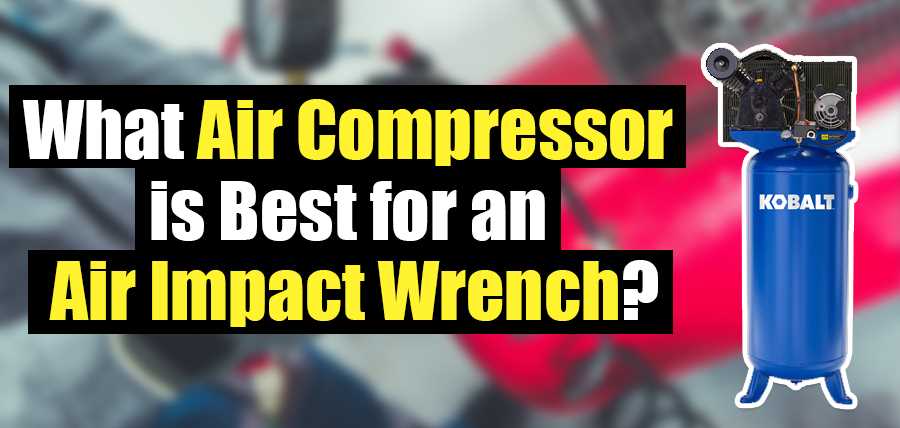
When choosing an air compressor for impact wrenches, one of the key considerations is portability. A portable air compressor allows you to easily move it from one location to another, making it convenient for use in different areas of your workshop or garage. Additionally, a smaller size can also be beneficial if you have limited space available.
Weight is an important factor to consider when looking at portability. A lighter air compressor will be easier to carry and transport, especially if you need to move it frequently. Look for models that are specifically designed to be lightweight.
Dimensions are also worth considering. Air compressors come in different sizes, so it’s important to check the dimensions to ensure it will fit in the space you have designated for it. Measure the available space and compare it to the dimensions of the air compressor to make sure it will fit comfortably.
Handle and wheels can greatly enhance the portability of an air compressor. A sturdy handle allows you to easily pick up and carry the compressor, while wheels make it much easier to roll it around, especially over uneven surfaces. Look for models with a comfortable handle and durable wheels.
Noise is another consideration when it comes to portability. If you plan on using the air compressor in a shared space or a noise-sensitive environment, look for models that have noise reduction features or are specifically designed to be quieter.
In conclusion, when choosing an air compressor for impact wrenches, consider its portability and size. Look for lightweight models with compact dimensions that will fit comfortably in your space. Consider features such as a handle and wheels for easy transportation, and look for models that are designed to be quiet if noise is a concern. By considering these factors, you can find the best air compressor that suits your needs.
Noise and Maintenance Factors
When choosing an air compressor for impact wrenches, it is important to consider the noise level and maintenance requirements. The noise level of an air compressor can vary significantly depending on the type and model. Some air compressors are designed to be quieter than others, which can be beneficial if you plan to use the impact wrench in a noise-sensitive environment.
Maintenance is another important factor to consider when selecting an air compressor. Different models may require different levels of maintenance, such as regular oil changes or filter replacements. It is important to consider how much time and effort you are willing to invest in maintaining your air compressor.
Noise Level
The noise level of an air compressor is measured in decibels (dB). Some air compressors have noise levels as low as 60 dB, which is about as loud as a normal conversation. Others can be much louder, reaching levels of 80 dB or higher. Keep in mind that prolonged exposure to high noise levels can cause hearing damage. If you plan to use your impact wrench in a residential area or a noise-sensitive environment, it is recommended to choose a quieter air compressor to avoid complaints from neighbors or coworkers.
Maintenance Requirements
The maintenance requirements of an air compressor can vary depending on the type and model. It is important to read the manufacturer’s instructions and specifications to understand the maintenance needs of your chosen air compressor. Some common maintenance tasks include regular oil changes, filter cleanings or replacements, and checking for any leaks or damages. Neglecting proper maintenance can lead to reduced performance or even damage to your air compressor. Consider how much time and effort you are willing to dedicate to maintaining your air compressor before making a purchase.
Tips for Selecting the Right Air Compressor for Impact Wrenches
1. Consider the CFM requirement
When choosing an air compressor for your impact wrench, it is essential to consider the CFM (cubic feet per minute) requirement of the wrench. The CFM requirement indicates the amount of air that the wrench needs to operate at its optimal level. Make sure to select an air compressor with a CFM rating that meets or exceeds the requirement of your impact wrench.
2. Pay attention to the PSI rating
Another crucial factor to consider is the PSI (pounds per square inch) rating of the air compressor. The PSI rating indicates the maximum pressure that the compressor can deliver. It is vital to choose an air compressor with a PSI rating that matches the requirement of your impact wrench. Ensure that the compressor can provide enough pressure to power your wrench effectively.
3. Portable or stationary?
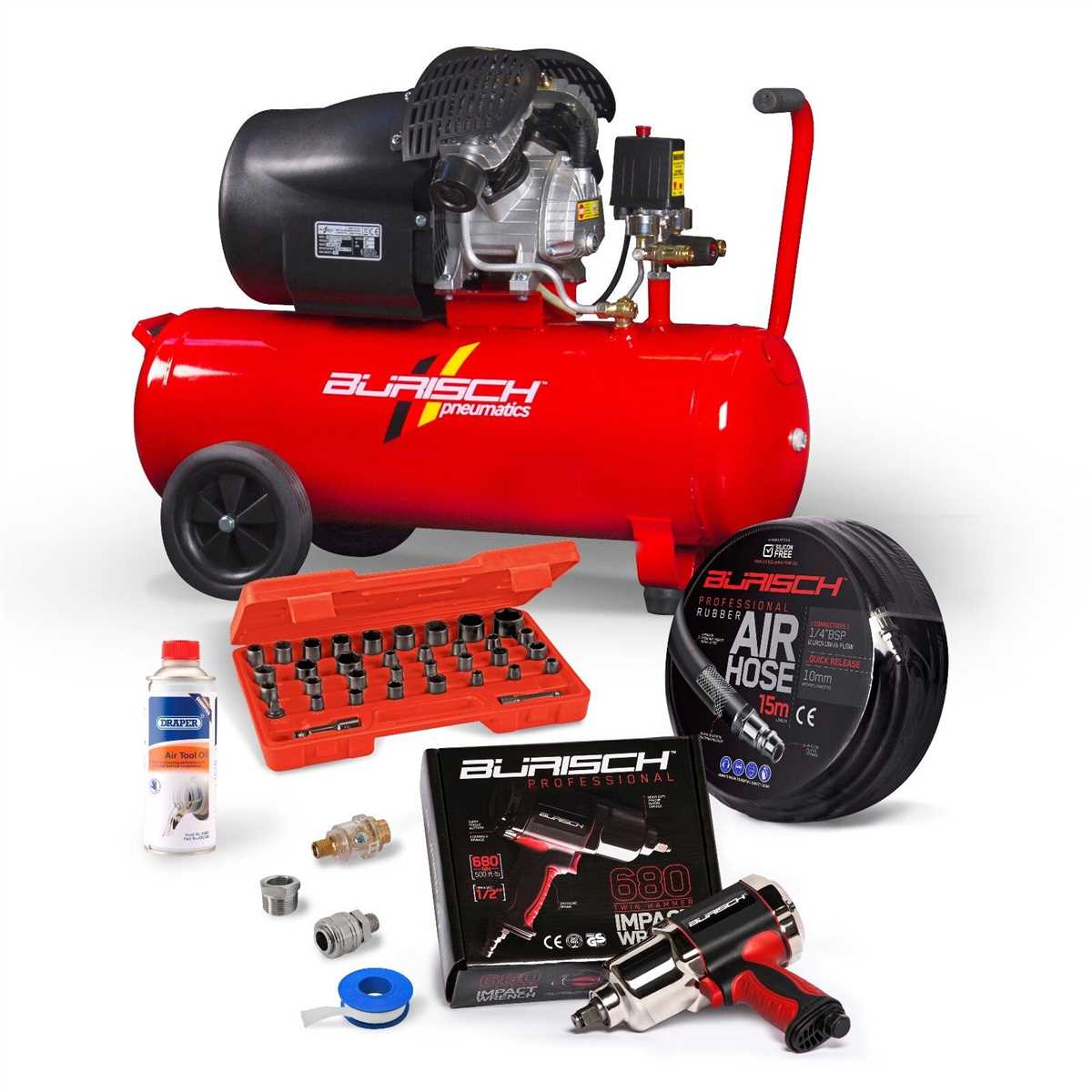
Decide whether you need a portable or stationary air compressor for your impact wrench. Portable compressors are lightweight and easy to move around, making them suitable for jobs that require mobility. On the other hand, stationary compressors are more powerful and are designed for heavy-duty applications. Consider the nature of your work and your specific needs to determine which type of compressor is right for you.
4. Tank size matters
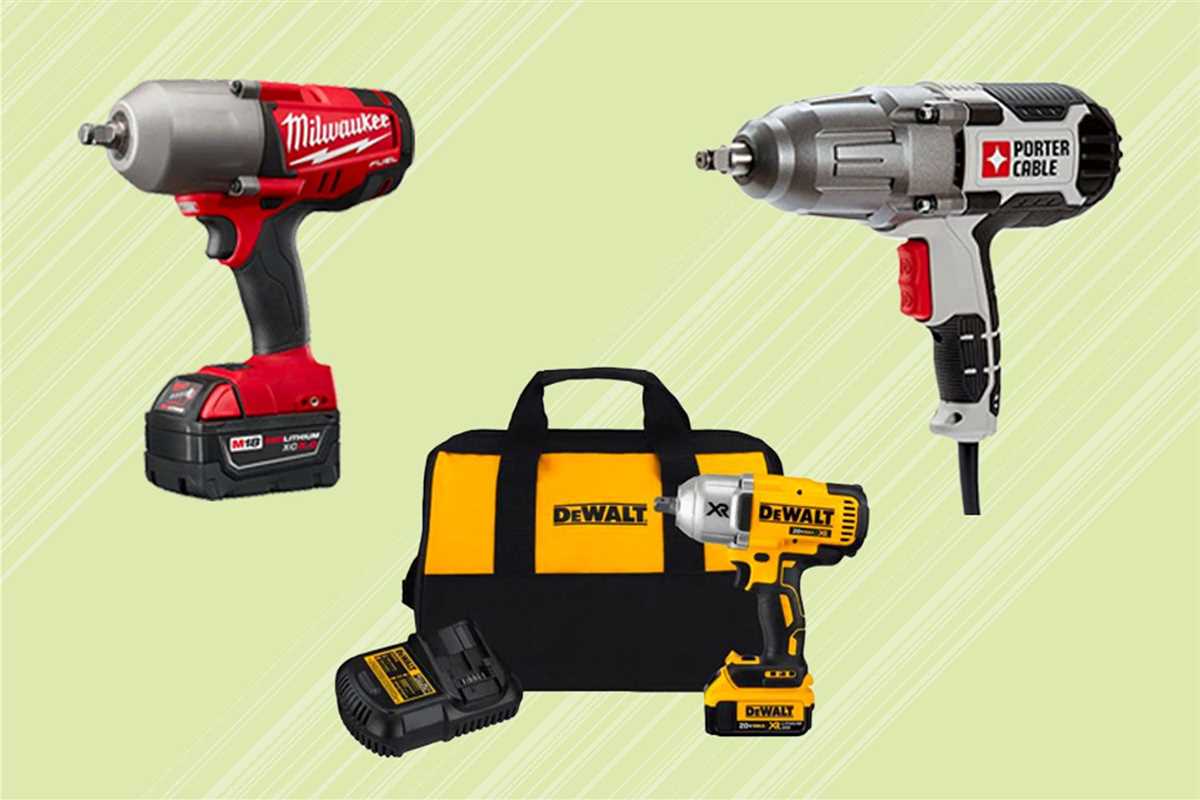
The tank size of the air compressor can also influence its performance when paired with an impact wrench. A larger tank size can provide more air storage, allowing the compressor to keep up with the demand of your wrench and prevent frequent cycling. However, keep in mind that larger tanks may also take up more space and may not be as portable as smaller ones.
5. Noise level
If noise is a concern for you or your work environment, consider the noise level of the air compressor. Some compressors are designed to operate quietly, reducing the disturbance caused by their operation. Look for compressors with lower decibel ratings to ensure a quieter working environment.
In conclusion, selecting the right air compressor for your impact wrench is crucial for achieving optimal performance. Consider the CFM requirement, PSI rating, portability, tank size, and noise level to make an informed decision. By choosing the right air compressor, you can ensure that your impact wrench operates efficiently and effectively for all your projects.
FAQ:
What is an impact wrench?
An impact wrench is a power tool used for tightening or loosening nuts and bolts. It delivers high torque output through a hammering mechanism, which allows for fast and efficient work.
What factors should I consider when choosing an air compressor for an impact wrench?
When choosing an air compressor for an impact wrench, you should consider the air pressure requirement of the impact wrench, the air flow rate or CFM (Cubic Feet per Minute) delivery of the compressor, the tank size, and the portability and power source of the compressor.
What is the ideal air pressure for an impact wrench?
The ideal air pressure for an impact wrench can vary depending on the specific model, but it is generally recommended to have an air pressure of around 90-100 PSI (Pounds per Square Inch) for most impact wrenches.
What is the significance of CFM in an air compressor for an impact wrench?
CFM, or Cubic Feet per Minute, is a measure of the air flow rate that an air compressor can deliver. It is important to choose an air compressor with a CFM rating that is equal to or higher than the CFM requirement of your impact wrench, as this ensures that the compressor can supply enough air to operate the wrench effectively.
Is portability an important factor in choosing an air compressor for an impact wrench?
Portability can be an important factor to consider depending on your specific needs. If you require mobility and need to carry the compressor to different job sites, then choosing a portable compressor with wheels and a compact design would be beneficial. However, if you have a dedicated workshop or work area, portability may not be as critical.
Video:









